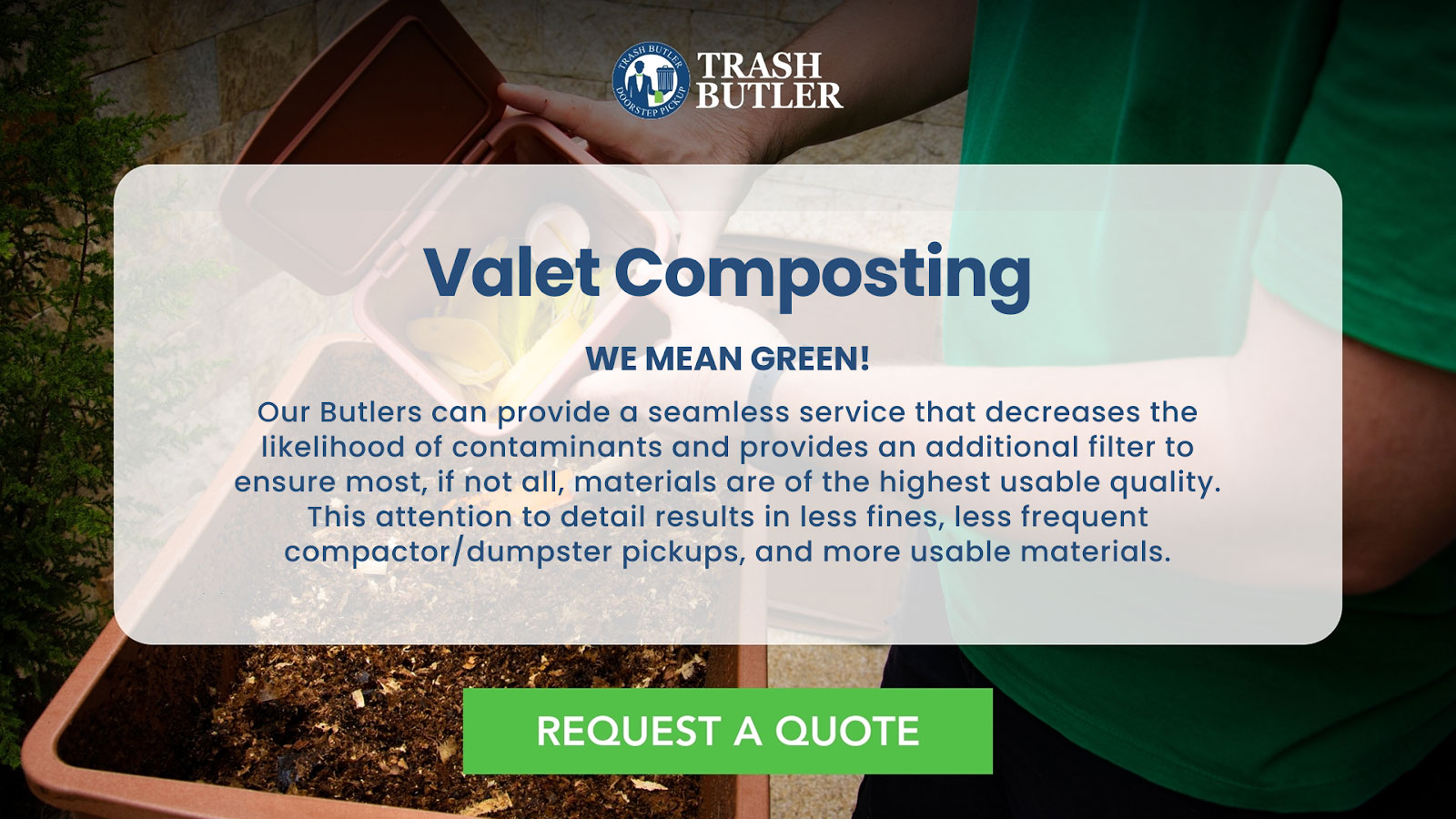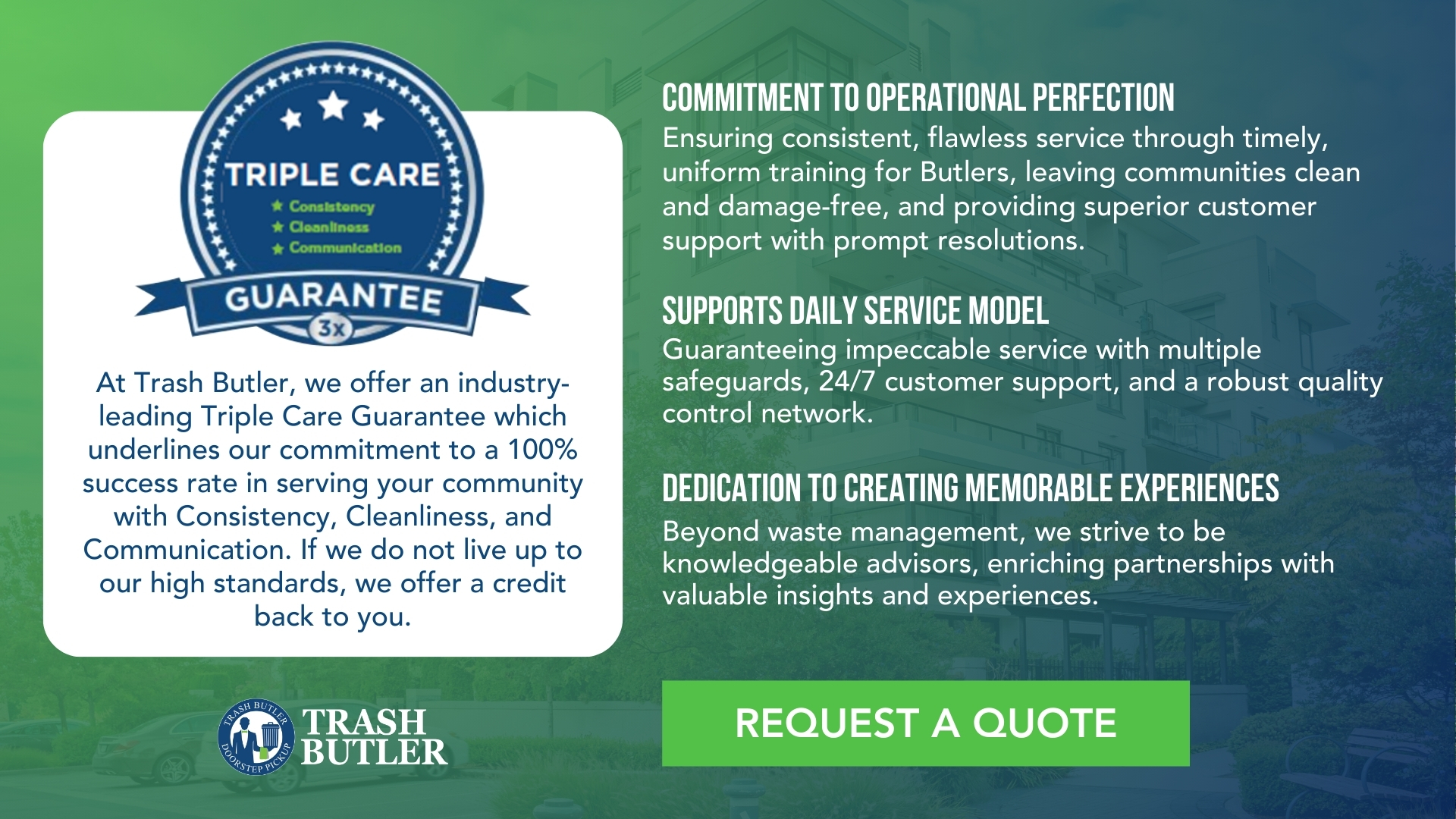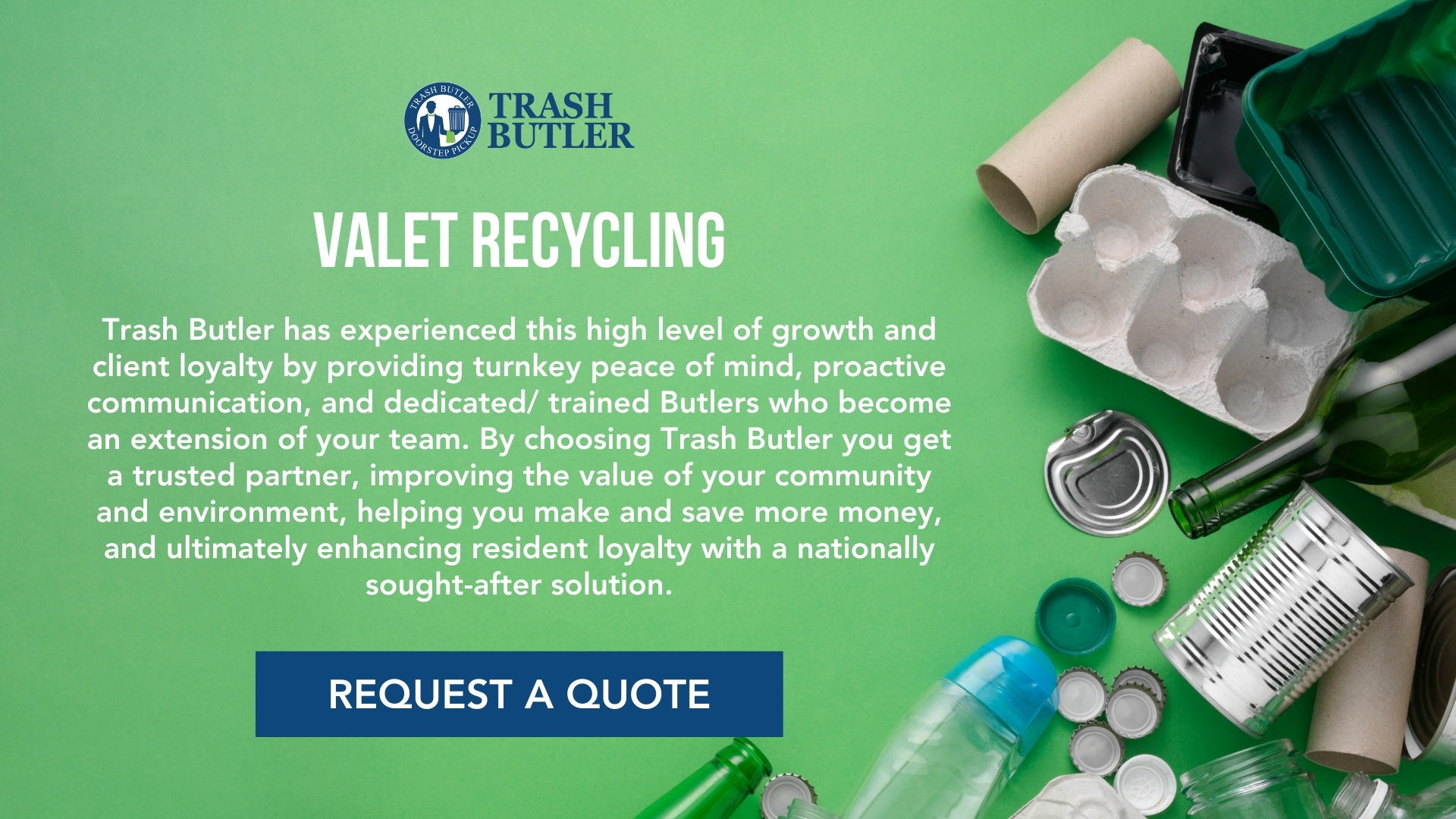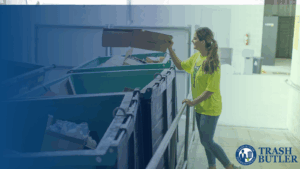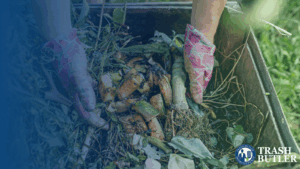Key Takeaways:
- Composting Reduces Landfill Waste & Emissions: Diverting organic waste through composting significantly lowers methane emissions and reduces landfill reliance, helping properties meet sustainability standards.
- Regulatory Compliance & Cost Savings: With stricter waste management laws, composting helps properties avoid fines, qualify for potential incentives, and cut rising landfill disposal fees.
- Enhances Property Value & Resident Appeal: Eco-conscious residents are drawn to communities with green initiatives, making composting a valuable investment in sustainability and tenant retention.
Sustainability is rapidly exceeding its buzzword origins – and becoming a requirement. With new environmental regulations pushing businesses and residential properties toward greener waste management solutions, property owners and managers are under increasing pressure to reduce landfill waste and lower their carbon footprint. But how can you meet these evolving standards without disrupting daily operations?
In this guide, we’ll unpack how composting services work, why they’re becoming essential, and how they can help your property align with the latest sustainability standards—without the hassle.
Understanding New Sustainability Standards
The landscape of environmental regulations is continually evolving, with new sustainability standards reshaping how multi-family communities manage waste. These standards emphasize reducing landfill contributions, increasing recycling rates, and implementing composting solutions. For property managers and residents, understanding and meeting these standards is both a responsibility and an opportunity to enhance the community’s environmental impact.
Emphasis On Waste Diversion
One of the core focuses of modern sustainability standards is waste diversion. This process involves redirecting waste from landfills through recycling and composting initiatives. Successfully implementing these practices is how properties may comply with local green ordinances while contributing to a significant reduction in their carbon footprint.
The Role Of Composting In Sustainable Living
Composting has emerged as a crucial component in addressing sustainability goals due to its effectiveness in reducing organic waste in landfills. Proper composting decreases methane emissions – a potent greenhouse gas – and produces nutrient-rich material that can be repurposed for landscaping.
Compliance With Local Green Ordinances
Many areas are implementing stringent green ordinances requiring properties to adhere to sustainable waste management practices. Compliance is not only a legal obligation but also a competitive advantage. Properties that stay ahead of these regulations can enhance their appeal to eco-conscious residents and reduce the risk of fines or penalties.
The Role Of Composting In Waste Management
Composting is crucial in modern waste management. It reduces landfill waste, cuts greenhouse gas emissions, and promotes a more sustainable handling of organic materials. As regulations push for greener waste solutions, composting has become essential for residential and commercial properties.
Reduces Landfill Waste
Organic waste makes up a significant portion of total waste generated by properties. Composting diverts food scraps, yard waste, and biodegradable materials from landfills, reducing overall waste volume and the strain on waste disposal systems.
Lowers Greenhouse Gas Emissions
When organic waste decomposes in landfills, it produces methane, a greenhouse gas far more potent than carbon dioxide. Composting allows organic materials to break down naturally, significantly cutting emissions and improving air quality.
Improves Soil Health And Sustainability
Compost creates nutrient-rich soil that enhances plant growth, reduces the need for chemical fertilizers, and promotes sustainable landscaping. Properties incorporating composting into waste management can support local environmental efforts while maintaining greener, healthier landscapes.
Supports Compliance With Sustainability Regulations
Many cities and states are implementing stricter waste management regulations, requiring businesses and residential properties to adopt composting programs. Properties can stay compliant and avoid potential fines or penalties by incorporating composting services.
Reduces Waste Management Costs
Since landfill disposal fees continue to rise, diverting organic waste through composting can help lower overall waste disposal costs. Many waste management providers offer composting services as part of a cost-effective sustainability strategy.
Benefits Of Composting For Multi-Family Properties
Due to rising eco-consciousness and regulatory pressures, multi-family properties are increasingly using composting solutions. Composting offers several advantages that align with residential communities’ sustainability goals. Here, we explore some key benefits these sustainable practices bring to multi-family properties.
Enhanced Environmental Stewardship
Implementing composting systems in multi-family properties markedly improves environmental stewardship. It significantly reduces landfill waste by diverting organic materials into composting processes, lowering methane emissions, and contributing to decreased overall environmental impact. This practice demonstrates a commitment to ecological conservation and aligns properties with broader governmental sustainability mandates.
Attraction And Retention Of Eco-Conscious Residents
Today’s residents are more environmentally aware and prefer communities that prioritize green practices. Properties can attract and retain eco-conscious residents who appreciate sustainability efforts by adopting a composting program. This initiative enhances property reputation and fosters a community culture centered on collective responsibility and environmental care.
Financial Incentives And Compliance
Composting contributes to significant cost savings through waste reduction and potential financial incentives or tax benefits offered by local governments. These programs can make initial investments in composting systems financially viable. Moreover, compliance with local recycling and composting ordinances can shield properties from fines and penalties, ensuring adherence to new sustainability regulations.
Improved Soil And Landscaping Health
Composted material creates nutrient-rich soil, which can be used to enhance landscaping efforts across a property. This practice supports lush, vibrant greenery and reduces costs associated with chemical fertilizers. Establishing on-site composting infrastructure enables communities to enjoy improved gardening results that contribute to overall aesthetic and ecological value.
Implementing Composting Services In Apartment Complexes
Integrating composting services into an apartment complex requires careful planning, resident participation, and the proper infrastructure. Here’s how property managers can successfully introduce and maintain a composting program.
Assess Waste Generation And Needs
- Conduct a waste audit to determine how much organic waste is produced.
- Identify common waste types, such as food scraps and yard waste, to tailor the composting program effectively.
Choose The Right Composting System
- On-Site Composting: Ideal for properties with available space and landscaping needs.
- Off-Site Collection Services: Partnering with a composting company to haul organic waste regularly.
- Community Composting Bins: Shared bins placed in designated areas for resident use.
Educate And Engage Residents
- Provide clear guidelines on what can and cannot be composted.
- Host workshops or distribute educational materials to encourage participation.
- Use signage and digital reminders to reinforce best practices.
Integrate Composting With Existing Waste Management
- Place compost bins near existing trash and recycling stations for easy access.
- Work with waste management providers to schedule regular pickups or compost processing.
- Ensure proper bin labeling to prevent contamination.
Monitor And Optimize The Program
- Track participation rates and address common challenges.
- Adjust bin placement and collection frequency based on resident feedback.
- Offer incentives or recognition for residents who actively participate in the program.
Composting vs. Traditional Waste Disposal Methods
As multi-family communities strive to align with modern sustainability mandates, understanding the differences between composting and traditional waste disposal methods becomes essential. Composting offers numerous environmental benefits that traditional trash handling simply cannot match, making it a valuable component of a sustainable waste management strategy.
Environmental Impact
Traditional waste disposal methods, such as landfilling and incineration, contribute significantly to environmental degradation. Landfills are a major source of methane emissions, a potent greenhouse gas, and incineration releases harmful pollutants into the atmosphere. In contrast, composting minimizes these effects by naturally recycling organic waste into valuable compost, reducing methane production and preserving air quality.
Economic Benefits
The financial ramifications of waste disposal can concern multi-family communities striving to manage costs effectively. Traditional waste disposal involves landfill tipping fees and transportation costs that can add up over time. Composting can reduce these expenses by decreasing the volume of waste sent to landfills, lowering fees and optimizing waste handling costs.
Overcoming Challenges In Composting Implementation
Implementing a composting program in multi-family communities can present several challenges, but these hurdles can be surmounted with effective strategies and expert support. Properties can enhance their sustainability efforts and meet increasingly stringent green standards by integrating a structured composting service.
Common Obstacles To Composting
One of the most prominent challenges in establishing a composting initiative is the initial resistance from residents unaccustomed to the process. Misunderstandings about what can and cannot be composted can lead to contamination issues, reducing the effectiveness of the composting effort. Additionally, odor and pest concerns may deter residents and property managers from fully embracing composting programs.
Strategic Solutions For Successful Implementation
Properties need comprehensive education and communication strategies to address these challenges. Trash Butler excels in providing tailored recycling education and contamination reduction measures, ensuring residents understand the composting process. Our uniformed “Butlers” engage with the community, offering guidance and support to foster habits that align with composting best practices.
Implementing dedicated food waste containers in strategic locations throughout the property can encourage participation and streamline the composting process. This setup simplifies sorting for residents and minimizes errors that can compromise compost quality.
Leveraging Technology And Expertise
Another effective way to overcome composting challenges is by leveraging technology. Trash Butler integrates innovative technology solutions to enhance service reliability and facilitate seamless resident communication. This tech-driven approach helps ensure that composting procedures are smooth and efficient, allowing properties to maintain high sustainability standards without burdening residents or management staff.
Choosing The Right Composting Service Provider For Maximum ROI
Selecting an effective composting service provider is crucial for properties that meet new sustainability standards while achieving a strong return on investment. A comprehensive approach ensures compliance with local ordinances and enhances property value and resident satisfaction. Here are some key considerations when choosing a composting service provider:
Expertise And Customization
A provider’s expertise in waste management and ability to tailor programs to a community’s specific needs are essential. Trash Butler offers customized composting and recycling solutions to fit diverse community profiles. Our team assesses each property’s unique requirements, implementing service plans that maximize waste diversion while minimizing contamination.
Technology And Communication
Advanced technology integration is crucial for reliable service and seamless resident engagement. We utilize innovative solutions to monitor service quality, track waste reduction progress, and facilitate clear communication between property managers and residents, ensuring everyone remains informed and engaged.
Track Record And Reputation
Providers’ experience speaks volumes about their ability to deliver on sustainability commitments. With a strong track record of managing over 300,000 units nationwide, Trash Butler has consistently helped properties create greener communities through dependable and effective waste management services.
Educational Initiatives
Educating residents about proper composting and recycling practices is key to reducing contamination and increasing participation. That’s why we incorporate recycling education into our programs, fostering a culture of sustainability that benefits both properties and their communities.
By partnering with Trash Butler, properties can confidently implement composting solutions that drive sustainability, compliance, and resident satisfaction.
Final Thoughts
Sustainability is no longer optional – it’s a necessity. With evolving regulations and growing eco-consciousness among residents, composting services offer a practical, cost-effective solution for properties to stay compliant and reduce environmental impact.
Integrating composting into waste management is how property managers may enhance community appeal, lower waste disposal costs, and contribute to a healthier planet. The key to success lies in choosing the right service provider, educating residents, and implementing a system that aligns with property needs.
Request a Quote: Fill out a form to see how Trash Butler™ can benefit your community.
Read also:
- Breaking Down The Benefits Of Composting For Apartment Complexes
- Composting For Urban Multifamily Properties: Challenges And Solutions
- Why Valet Recycling Is A Must-Have For Green-Certified Properties
Frequently Asked Questions About How Composting Services Can Help Properties Meet New Sustainability Standards
What types of waste can be composted?
Composting services can process various organic materials, including fruit and vegetable scraps, coffee grounds, eggshells, grass clippings, leaves, and some biodegradable yard waste. However, items like meats, dairy products, and large branches may not be suitable for typical composting operations and require special processing.
Can composting reduce a property’s waste footprint?
Yes, composting can significantly reduce a property’s waste footprint by diverting a large portion of organic waste from landfills. Recycling organic materials into compost properties can decrease their environmental impact, lower waste disposal costs, and contribute to meeting sustainability standards.
Are there any legal requirements for composting?
Many regions have regulations governing waste management practices, including composting. Properties must comply with local ordinances that mandate food waste diversion, particularly in municipalities striving towards zero-waste goals. Professional composting services such as those offered by Trash Butler often ensure compliance with these regulations, mitigating any legal challenges for property managers.
What is the difference between on-site and off-site composting?
On-site composting involves processing waste at the location where it is generated, typically using designated spaces and composting equipment. Off-site composting, in contrast, involves transporting waste to a centralized facility where it is processed on a larger scale.
Can composting services be used for all property sizes?
Yes, composting services can be customized to fit any property size. Whether a small apartment complex or a large multi-family community, services can be tailored to meet specific waste management needs.
How long does it take for waste to compost?
The time it takes for waste to compost depends on various factors, including the type of waste, composting method, and conditions such as temperature and aeration. Generally, the composting process can take a few weeks to several months. Professional composting services often accelerate this process through optimized practices, providing ready-to-use compost more efficiently.



